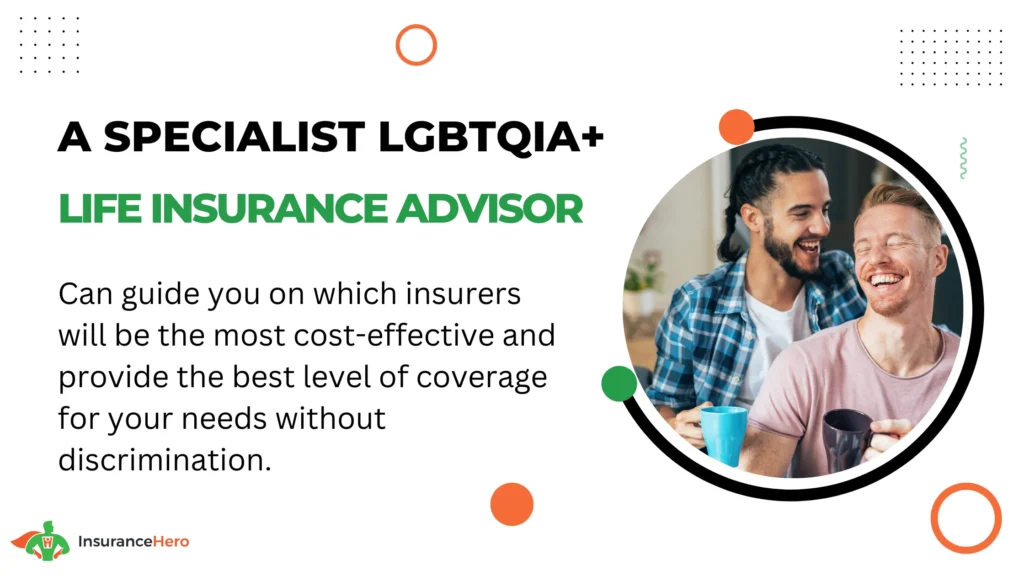Lesbian, Gay, Bisexual And (LGBTQ+) Life Insurance Cover

Everyone needs to be protected financially, and connecting with an LGBTQ+-friendly life insurance advisor is a good place to start.
Someone who understands the industry and won’t let any prejudice of lifestyle stand in the way of providing you good terms and policies with fewer exclusions and at the same price as any heterosexual person or couples for joint policy applications in the case of Civil Partnerships.
Why Choose Us?
- Premiums for many age groups are superior to many “household name” insurers
- Outstanding reviews for customer care
- Policies with excellent rates for shared coverage, including same-sex couples
- Terminal illness coverage at no extra cost (available on term policies)
- High-quality, low-cost life insurance for LGBTQ+ couples
- No blood tests, medicals or forms. Request a call or get your free quote today!
Compare LGBTQ+ Insurers · No Obligation · Free Quote Below


LGBTQ Life Insurance Explained…
Life insurance provides a level of cover tailored to your needs, and it’s no different for the LGBTQ community than it is for anyone else.
The only difference is that you must navigate the insurance market precisely to spot the good deals from the not-so-good.
You want more inclusions than exclusions, which can sometimes happen with insurance products.
Discrimination isn’t supposed to happen, but it can, and the law allows it in certain situations.
However, the Equality Act 2010 grants equality as a legal right. The days of denying applications citing “no legal, financial jurisdiction” because of sexual orientation or lifestyle are over.
| Topic | Our Summary |
|---|---|
| Life Insurance Options | You can choose between single and joint life insurance policies, as there are no exclusive plans for same-sex couples. |
| Financial Security | Life insurance helps cover mortgage payments, living expenses, childcare, and funeral costs if one partner passes away. |
| Impact of Marital Status | Married and civil partnership couples have legal protections, while unmarried couples may need additional safeguards. |
| Joint vs. Single Policies | Joint policies are often cheaper but pay out once, while single policies provide separate payouts for each partner. |
| Types of Policies | Options include term life insurance, whole of life insurance, over 50s plans, and family income benefit, depending on financial needs. |
| Critical & Terminal Illness Cover | Some policies allow early payouts for serious illnesses, helping with medical or financial burdens. |
| Writing Policy in Trust | Placing a policy in trust avoids inheritance tax and probate delays, ensuring faster access to funds. |
| Naming Beneficiaries | Partners can be named as beneficiaries, ensuring the payout goes to the intended recipient. |
| Cost Factors | Premiums vary based on age, health, and lifestyle, with policies starting from as little as £5 per month. |
Who’s Protected?
The Equality Act 2010 provides equal rights for nine groups of people with the following characteristics, which are called “Protected Characteristics.”
For goods and services, insurance firms cannot discriminate against particular groups of people with a Protected Characteristic under Regulation 27 of The Equality Act (Sexual Orientation) Regulations 2007.
Protected Characteristics include:
- Age
- Disability
- Gender reassignment
- Marriage and civil partnership
- Pregnancy and maternity
- Race
- Religion or belief
- Sex
- Sexual orientation
That last part is the saving grace for buying LGBTQ+ life insurance. The policy’s name does not imply that it differs from any other insurance product. It only indicates that the insurer selling the policy understands the particular needs of the LGBTQIA+ community.
To distinctly sell the policy as LGBTQ life insurance would, by its nature, be discriminatory as it would separate it from the whole-of-market products. Life insurance is life insurance.
It is a whole-of-market product because of the Equality Act 2010. However, some insurers will better understand your needs.
Others will only follow best practice guidelines from the ABI (Association of British Insurers), which means you will receive advice from a financial advisor who is reading from a textbook.
Not the best way to go about financial planning and protecting your future and your loved ones. Wouldn’t you agree?
Instead of approaching mass-market insurance firms, it’s more advisable to seek out a financial advisor with a speciality in equality or a company like Insurance Hero with an appointed advisor specifically for addressing the needs of Gay men, MSM (men who have sex with men), Lesbian women, Trans people, Bisexual and Alternative Families (same-sex couples with a family).

HIV Life Assurance
Since 2009, HIV Life Assurance products have been available. HIV is treated the same as any other pre-existing medical condition.
The only questions the insurance firm can ask are those relevant to assessing your level of risk. Insurers are only allowed to assess your risk level without prejudice.
You cannot be categorised as high-risk because you’re part of a same-sex couple. You can be asked if you’ve been tested for HIV, are awaiting results, or have contracted a Sexually Transmitted Disease in the past five years, the same questions that can be asked of a heterosexual person.
You cannot be treated any differently. If you have been tested, you don’t need to disclose negative results, but you do need to inform a positive outcome.
If you are HIV positive, you’d likely need a specialist insurance provider. That’s the same for any number of pre-existing medical conditions. Some insurers refuse entirely to issue policies covering existing illnesses.
That doesn’t mean they’re discriminating, though, as you wouldn’t be treated any less favourably than someone who didn’t have a Protected Characteristic. The insurer would treat everyone with any existing illness the same and refuse cover.
Protecting You from Financial Discrimination
Financial discrimination can happen if an insurer quotes you a higher price without justification. You cannot be refused a product or a service because of a Protected Characteristic, nor can you receive a worse quality of service because of a Protected Characteristic.
It’s about equality, treating everyone as individuals, and positively recognising and responding to differences (diversity).
Are there LGBT specialist insurance brokers available?
There aren’t many specialist insurance companies specific to the LGBTQ+ community. However, many groups offer advice or act as intermediaries with advisors from financial institutions to help tailor products to individual needs.
Insurance Hero has many years of experience helping people from the LGBTQIA+ community get the coverage they need without discrimination.
Extending Advice for Alternative Families
Reviewing your financial protection at the early stages of family planning makes sense for same-sex couples. Nineteen years is the advised term to plan for.
How much cover you need would be based on how much debt you owe – at the minimum. This is the same for any family to ensure financial protection in place for your family in the event the worst happens.
Financial advice concerning the amount, level, and type of life cover needed for those adopting or planning to start a family is sought. A solicitor specialising in equality law would be best placed to assist with other forms of financial protection, such as making a Will.
Same-Sex Partners Vs Civil Partnership or Civil Marriage
A Civil Partnership or Civil Marriage provides the same recognised spousal rights as heterosexual couples. This should be considered for future tax planning purposes. Same-sex couples who have not entered into a Civil Partnership or Civil Marriage will be liable to pay Inheritance Tax on the value of the person’s estate.
Statistics from Santander indicate that cohabiting same-sex couples increased by 68% from 2015 to 2025. 6% had dependent children living at home.
Before the Civil Partnership Act 2004, same-sex couples couldn’t plan for inheritance tax using life insurance.
With a Civil Partnership or Civil Marriage, Wills can be made, and spouses can name the beneficiaries, making forward tax planning possible… up to the value determined by the HMRC. The Estate includes all money, property and assets.
Cohabiting same-sex couples should seek financial advice on life insurance to ensure the policy’s value covers all outstanding debt and the potential inheritance tax bill.
How Can I Tell if an Insurance Firm is LGBT-Friendly?
It’s tricky, but it can be done. One of the more recent ways is to observe the process of applying for a quote online. The title Mx is used by trans people—those who don’t identify as male or female.
The majority of applications have standard titles:
- Mr
- Mrs
- Miss
- Ms
LGBTQ-Friendly processes have the additional title of Mx available. It indicates that they recognise that not everyone is male or female. Recognition is a good starting point.
The government, Royal Mail, the NHS and many other organisations have begun to officially recognise and quietly roll out the use and recognition of the Mx title.
It’s just not widely reported in the media, so there’s been no fanfare to let people know they can use the Mx title on official documents, including your driving licence.
Diversity and Inclusion policies are also a handy indicator of an LGBT-friendly insurer or advisor. These are available on the website or perhaps by request.
The 2 Types of Life Insurance for Gay Couples
The whole of life is just as it sounds. It provides an agreed level of cover payable upon the policyholder’s death to the named beneficiary.
Term life insurance is adjustable and for a fixed period. You can take it as annual cover for a five-year, ten-year, or twenty-year fixed period.
Term life insurance is best used for a fixed lump sum to cover all outstanding debts that you know of. It is difficult to know how much debt you’ll have when or if the policy is needed.
After the initial agreed time for the cover, such as five years, after that is up, you’ll need to renew, and that will (usually) increase the cost.
LGBTQ Support Networks
The LGBTQ community is active. There has been a lot of change, support, and campaigning to increase awareness of LGBTQ issues.
Organisations actively campaigning for better rights and equality are often best placed to advise on financial matters concerning the community members they represent.
Stonewall is among the largest LGBT groups in the UK. They operate globally and work with several partners.
The group has a Global Diversity Champions Programme, which businesses work with them to support diversity and inclusion in the workplace.
This won’t apply to consumers, but those listed as members of the Global Diversity Champions Programme will better understand the needs of the LGBT community. However, the list is from a workplace perspective, not a consumer standpoint.
Some of the members include:
- Lloyds Banking Group
- Barclays
- Emerald Life
- Aviva
New For 2025
Every insurance firm can provide you with an LGBT-friendly life insurance policy. However, they must abide by rules related to the questions they ask.
They can’t outright ask you if you’re gay, but they can ask if you’ve contracted STDs in the past five years, such as HIV, Hep B and Hep C, which can indicate a higher risk.
There are laws in place to protect you against financial discrimination. There’s also an entire community with active and specialist insurance brokers to advise on the correct type of life insurance and offer impartial advice to help you decide the best LGBT-friendly life insurance product the market offers.
Some are highly customisable to cater to any variety of personal situations.
Steve Case is a seasoned professional in the UK financial services and insurance industry, with over twenty years of experience. At Insurance Hero, Steve is known for his ability to simplify complex insurance topics, making them accessible to a broad audience. His focus on clear, practical advice and customer service excellence has established him as a respected leader in the field.


